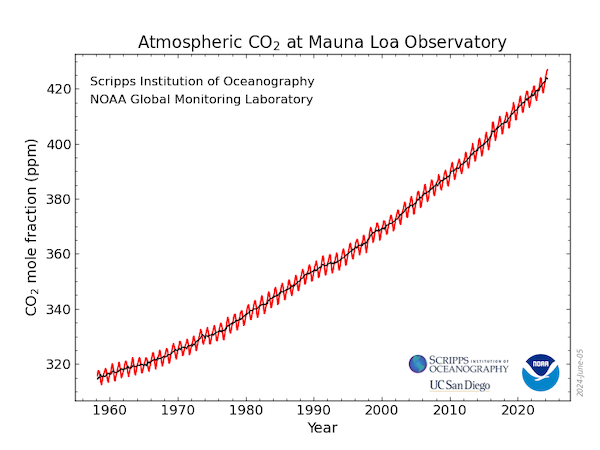One of the major drivers of the exceptional heat building within Earth's atmosphere has reached levels beyond anything humans have ever experienced, officials announced on Thursday. Carbon dioxide, the gas that accounts for the majority of global warming caused by human activities, is accumulating "faster than ever," scientists from NOAA, the Scripps Institution of Oceanography and the University of California San Diego found.
"Over the past year, we've experienced the hottest year on record, the hottest ocean temperatures on record, and a seemingly endless string of heat waves, droughts, floods, wildfires and storms," NOAA Administrator Rick Spinrad said in a press release. "Now we are finding that atmospheric CO2 levels are increasing faster than ever."
The researchers measured carbon dioxide, or CO2, levels at the Mauna Loa Atmospheric Baseline Observatory. They found that atmospheric levels of the gas hit a seasonal peak of just under 427 parts per million in May — an increase of 2.9 ppm since May 2023 and the fifth-largest annual growth in 50 years of data recording.
It also made official that the past two years saw the largest jump in the May peak — when CO2 levels are at their highest in the Northern Hemisphere. John Miller, a NOAA carbon cycle scientist, said that the jump likely stems from the continuous rampant burning of fossil fuels as well as El Niño conditions making the planet's ability to absorb CO2 more difficult.

This graph shows the full record of monthly mean carbon dioxide measured at Mauna Loa Observatory, Hawaii. The carbon dioxide data on Mauna Loa constitute the longest record of direct measurements of CO2 in the atmosphere. NOAA Global Monitoring Laboratory
The surge of carbon dioxide levels at the measuring station surpassed even the global average set last year, which was a record high of 419.3 ppm — 50% higher than it was before the Industrial Revolution. However, NOAA noted that their observations were taken at the observatory specifically, and do not "capture the changes of CO2 across the globe," although global measurements have proven consistent without those at Mauna Loa.
CO2 measurements "sending ominous signs"
In its news release, NOAA said the measurements are "sending ominous signs."
"Not only is CO2 now at the highest level in millions of years, it is also rising faster than ever," Ralph Keeling, director of Scripps' CO2 program, said in the release. "Each year achieves a higher maximum due to fossil-fuel burning, which releases pollution in the form of carbon dioxide into the atmosphere. Fossil fuel pollution just keeps building up, much like trash in a landfill."
Carbon dioxide "acts like a blanket in the atmosphere," NOAA explained — much like other greenhouse gases that amplify the sun's heat toward Earth's surface. And while carbon dioxide is essential in keeping global temperatures above freezing, having such high concentrations shoots temperatures beyond levels of comfort and safety.
That warming is fueling extreme weather events, and the consequences are aleady being felt, with deadly floods, heat waves and droughts devastating communities worldwide and agriculture seeing difficult shifts.
The news from NOAA comes a day after the European Union's climate change service, Copernicus, announced that Earth has now hit 12 straight months of record-high temperatures, a trend with "no sign in sight of a change."
"We are living in unprecedented times. ... This string of hottest months will be remembered as comparatively cold," Carlo Buontempo, director of Copernicus, said.